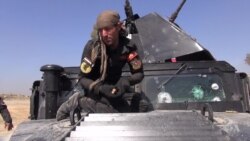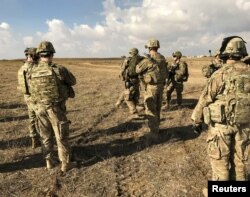A senior commander says Iraqi militarized police have captured a neighborhood on the western side of Mosul amid fierce clashes with Islamic State militants.
Major General Haider al-Maturi of the Federal Police Commandos Division told The Associated Press that his troops entered the Tayaran neighborhood Sunday morning and it is now “under their full control.’’
Al-Maturi said Islamic State militants deployed at least 10 suicide car bombs, but nine of them were blown up before reaching their targets. The 10th killed two policemen and wounded five.
Iraqi forces, backed by aerial support from the U.S.-led international coalition, already control eastern Mosul. Iraq’s second largest city is split roughly in half by the Tigris River.
Earlier, Iraqi military officials said U.S.-backed forces are facing a stiffer resistance as soldiers push deeper into the western half of the city, the last refuge of IS in Iraq.
Lieutenant Colonel Abdulamir al-Mohammadawi told the French news agency several elite units that previously recaptured the Mosul airport were moving north toward the center of the city, where they planned to retake the Turkish consulate and other government buildings.
He said the troops are facing increasingly heavy resistance as they move further into the IS-held city.
“Daesh [Islamic State] is using houses full of residents as human shields,” al-Mohammadawi told AFP.
WATCH: Fighting is Fierce on the Edge of Western Mosul
Retaking the airport
The advances come after counter-terrorism troops regained control late last week of the airport in Mosul that had been controlled by IS since 2014.
The takeover of the airport gives Iraqi troops access to Mosul from the southwest and for the first time control of an area along the west bank of the Tigris River.
IS insurgents were pushed out of eastern Mosul in January, but the militant group still controls the western section of the city.
Little was left inside the airport, and what was once a runway was littered with dirt and debris. Other buildings in the airport complex had been leveled by Islamic State forces.
The Iraqi forces also seized an Islamic State weapons storage warehouse, as well its one-time headquarters and barracks.
Slow advance
The advance to retake the remainder of western Mosul may take some time. It took three months for Iraqi forces to seize control of the eastern part of the city.
International relations professor Houchang Hassan-Yari of the Royal Military College of Canada told VOA’s Persian service the concentration of civilians in western Mosul will make it harder for Iraqi government forces and their coalition allies to retake that part of the city.
“Comparing this situation to the recent battle for the Syrian city of Aleppo, Syrian government forces and their Russian allies directly attacked civilians [as they retook the city last November and December],” said Hassan-Yari on VOA Persian’s NewsHour program.
“In Mosul, Iraqi government forces and their U.S.-led coalition partners have significantly restricted themselves in terms of the firepower they are using, in order to save the lives of civilians,” he noted.
Damascus and Moscow have denied targeting civilians in Aleppo.
U.S. forces have played a key role in the advance of Baghdad’s troops, launching airstrikes and providing advisers on the ground. On Thursday, U.S. forces were seen in the front lines of the attack.
The American forces are not supposed to be engaged in the fighting under Washington’s terms of the U.S. involvement in Iraq. But a coalition spokesman, Air Force Colonel John Dorrian, said Wednesday that in recent weeks they have gotten so close to the front that they have come under attack near Mosul and returned fire.
Many of those civilians in western Mosul were forced out of the eastern part of the city during heavy fighting there last month.
Meanwhile, aid agencies are worried and preparing for the possibility that up to 250,000 people might flee Mosul in the coming days or weeks.
The U.N. refugee agency has said it is focusing its efforts on building new camps to house the displaced. The United Nations High Commissioner for Refugees has completed eight camps and says it is planning to start work at another site south of Mosul.
Parisa Farhadi, Babak Azma and Sara Dehghan of VOA's Persian Service contributed to this report.









